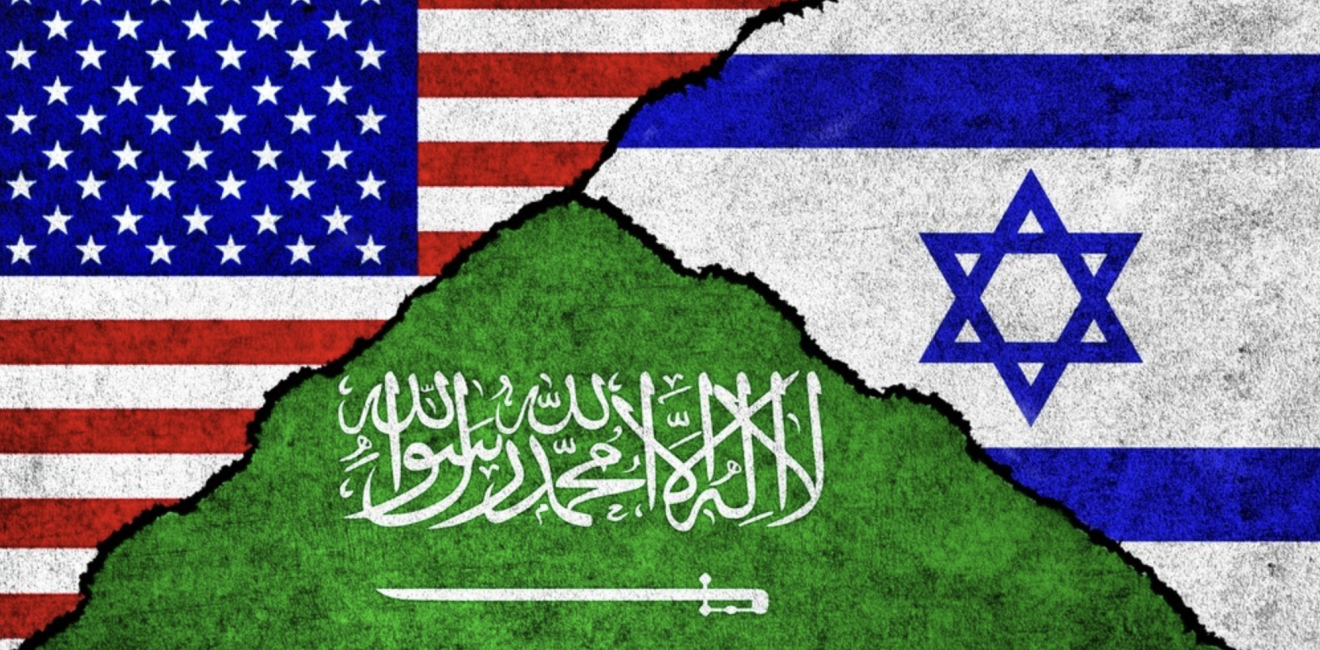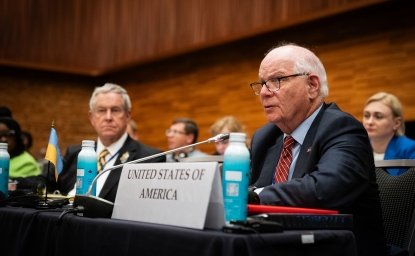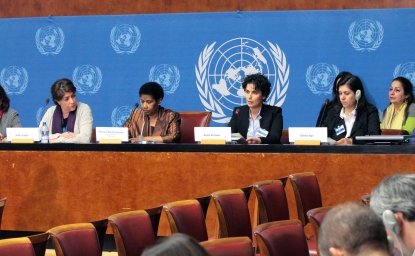The Biden Administration is committed to the Abraham Accords process and has its eyes set firmly on the big prize: achieving a Saudi Israeli normalization deal. However, the path to this objective is mired with challenges.
For the sake of analogy, Saudi Arabia is like a top free agent in the National Basketball Association (NBA) who the US and Israel aim to acquire in a three-way trade by swapping assets to accomplish a single transaction. Obviously, each side has its own demands and preconditions.
The big trade
Saudi Arabia is satisfied with its free agent status but is willing to consider the right offer, which according to media reports includes a security pact with the US, a civilian nuclear program, and Israeli concessions to the Palestinians. The Saudis know they will not get all these items, but it is not clear if these demands are a starting point of negotiations or meant to buy time.
In return, the US wants Saudi Arabia to halt sensitive transactions with China, to be more aligned with US interests, and to find a way to resolve the conflict in Yemen. Israel aims to have Saudi Arabia more involved in deterring Iran and obviously stands to gain from the wider political and economic impact of normalizing relations with a key Arab and Muslim country.
Israel aims to have Saudi Arabia more involved in deterring Iran and obviously stands to gain from the wider political and economic impact of normalizing relations with a key Arab and Muslim country.
Those three actors also have their own domestic considerations. The Saudi position is primarily driven by securing the inevitable ascendance of Crown Prince Mohammad bin Salman (MBS) to the throne, but also by deterring Iran and finding a public rational to make the “trade.” The only way to mitigate any repercussions internally from a normalization deal is to show that Saudis won something for the Palestinians in return, which echoes the “land for peace” mantra of the 2002 Saudi-led Arab League peace initiative.
Ending the conflict in Yemen will appease the US liberal base, which could allow the White House to rally additional votes in the Senate for a US-Saudi security pact if it is part of a normalization deal. Prime Minister Benjamin Netanyahu seeks to secure a major diplomatic victory amidst judicial tensions in Israel but might provoke a crisis in the ruling coalition if major concessions to the Palestinians are offered. Thomas Friedman has exaggerated his analysis a bit in predicting that a Saudi Israeli normalization deal would mitigate any criticism from the far-right Israeli ministers on concessions to the Palestinians, which might be limited to pledges to halt settlements or annexation of the West Bank.
For the Israeli far right, the biblical significance of the West Bank far exceeds peace with Mecca. Netanyahu told Bloomberg TV on August 7 that the Palestinian issue is “a lot less than you think” on the agenda of negotiating normalization with the Saudis and affirmed that his government categorically rejects the idea of a viable Palestinian state, which puts him at odds with the Biden administration on this issue. MBS has less affinity to the Palestinian issue than King Salman but does not want to take the risk of signing off on a normalization deal before his own ascendance to the throne.
Too little too late
The Biden administration initially gave MBS the cold shoulder because of US domestic pressure after the killing of Jamal Khashoggi, but realpolitik kicked in soon after. Soaring global oil prices after the Russo-Ukraine conflict enticed the White House to reengage Riyadh. In his July 2022 Middle East tour, Biden affirmed that the US “will not walk away and leave a vacuum to be filled by China, Russia or Iran” but this visit did not accomplish its objectives, neither in energy nor in strategy, beyond opening Saudi airspace to Israel.
Biden affirmed that the US “will not walk away and leave a vacuum to be filled by China, Russia or Iran”
The Saudi leadership, however, continued its independent foreign policy streak after that. Riyadh welcomed China's leader, Xi Jinping in December 2022, and additional lucrative business deals soon ensued. Last March, Saudi Arabia resumed diplomatic relations with Iran in a deal mediated by China. Indeed, the Saudis have put the US on notice by embracing rival powers.
The Biden administration has reinvigorated its engagement with Saudi Arabia and in the Gulf since last spring. White House officials have visited Riyadh four times since last March. Earlier this month, the Pentagon sent 3,000 Navy personnels and Marines, which follows the deployment of fighter jets and a Navy destroyer. These assets are meant to deter Iran from seizing additional commercial oil tankers in Gulf waterways in retaliation for the US confiscating shipments of sanctioned Iranian oil to East Asia. A US official has linked this move to strategic competition in the Gulf by stating that Iranian activities have “drawn Gulf states closer to Iran,” which “sends a signal to regional partners that in the absence of US forces, the US is not serious about security.” Moreover, the US wants Saudi Arabia to curtail its military, monetary, and technology transactions with China. However, these US moves might be too little too late. China is already helping Saudi Arabia build its own ballistic missiles along with established business transactions and investments.
China is already helping Saudi Arabia build its own ballistic missiles along with established business transactions and investments.
It is also late in the game for the Saudis to impose preconditions when it comes to the Palestinian issue. The normalization taboo is already broken with the United Arab Emirates. Riyadh could have played a leadership role by evoking “land for peace” when this process started in late 2020, but instead it gave Bahrain and the UAE the green light to move forward with normalization. Obviously, no one is expecting the Saudi monarch in Israel any time soon as Riyadh prefers to keep the engagement covertly, at least as long as the current Saudi King is on the throne. As a US official described, the Saudi Israeli normalization talks as meant to “test the boundaries of what’s possible.” The Biden administration wants this “trade” to happen, which means having Saudi Arabia on the US team. However, there are complex dynamics. Convincing Saudis to stay away from China might be difficult if Israel and China are negotiating a trade agreement, and China is the second largest trading partner of Israel after the US.
Sending US military assets and offering security agreements to Saudi Arabia could increase US military involvement in the Middle East in the long-term. Now, Netanyahu also wants to tie to this normalization deal to a security agreement with the US focused on deterring Iran, which is meant to complicate US-Saudi talks on this issue. Israeli foreign minister Eli Cohen wrote an op-ed in the Wall Street Journal suggesting to follow the South Korean model where the US puts Saudi Arabia under its security umbrella instead of building its own civilian nuclear program. Moreover, giving any meaningful concessions to the Palestinians cannot be achieved without Israeli cooperation.
Sending US military assets and offering security agreements to Saudi Arabia could increase US military involvement in the Middle East in the long-term.
The US is linking the Saudi Israeli normalization deal to deterring China and Israel is linking it to deterring Iran. While it is prioritizing the deterrence of Iran in these talks, what is more important for Saudis at this stage is to have enough margin to act independently and do business with everyone. Linking the Saudi Israeli normalization to strategic competition or resolving any conflict in the Middle East will only undermine all these objectives.
The cart before the horse
Mixing policies is short sighted without a clear strategy to bind them all. It is like the concept of “riders” or the policy changes that often burdens the appropriation bills of the US Congress. Combining all these issues in one deal is a recipe for failure. Is the normalization deal worth a US security pact with Saudi Arabia? Will Israel veto the Saudi civilian nuclear program? Can Saudi Arabia normalize with no significant Israeli concessions to the Palestinians? If isolated, would Iran complicate the fragile truce in Yemen and Gaza? While all these items overlap, one contentious issue might crumble the whole process.
Previous normalization deals were largely driven by one single issue. Moroccan normalization was exchanged for US recognition of Moroccan sovereignty over Western Sahara. Sudan normalization was offered in return for removing Sudan from the state sponsors of terrorism list and helping with the country’s massive debt.
For Saudi Arabia, there is more to take than give in this transaction. There is no high priority item that Saudi Arabia desperately needs. This normalization should not be overloaded to resolve all regional conflicts and insecurities. The key is to figure out the main issue that the Saudi leadership really prizes and decide whether the US is willing to pay the price to meet that demand, and whether Israel can be onboard.
US media is already conjuring the great things that will come out of this deal, echoing the exaggerated talk of the “deal of the century” during the Trump administration. A Saudi Israeli normalization deal is no answer to the strategic competition with China nor to Iranian threats. Pressing an imminent normalization will only make Saudis raise their price and Israelis to set their own preconditions.
A Saudi Israeli normalization deal is no answer to the strategic competition with China nor to Iranian threats.
The Biden administration should not put the cart before the horse. Alternatively, creating a conducive environment on the ground for the Palestinians might go a long way. Finding the right formula to deter and engage an increasingly vulnerable Iran is inevitable. By then, any normalization deal might be smoother to achieve and less costly for US taxpayers.
The views expressed in these articles are those of the author and do not reflect an official position of the Wilson Center.







